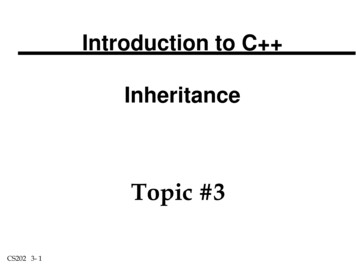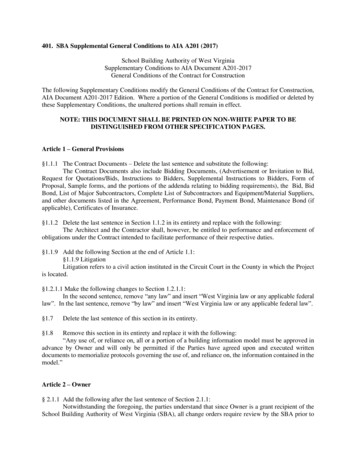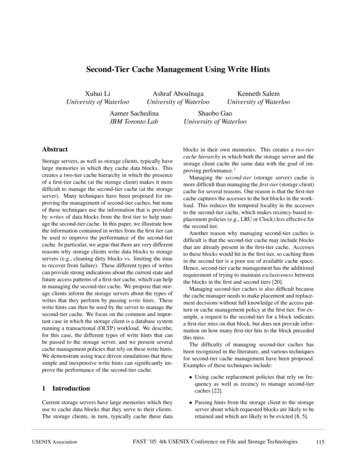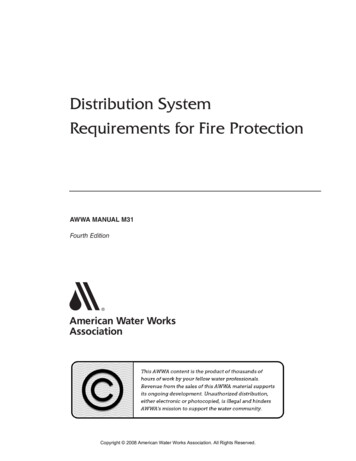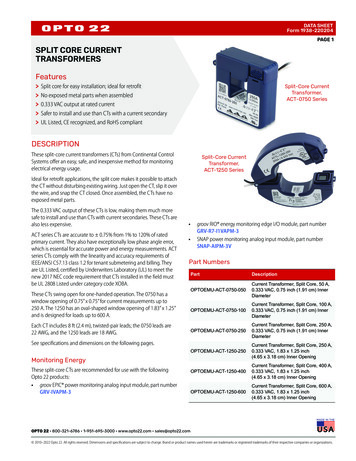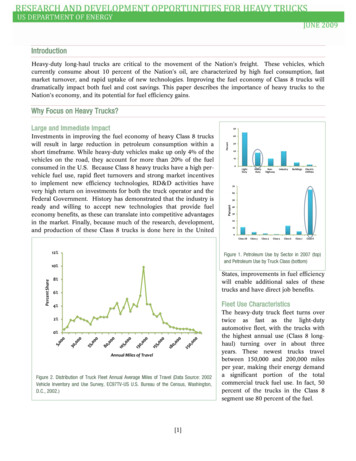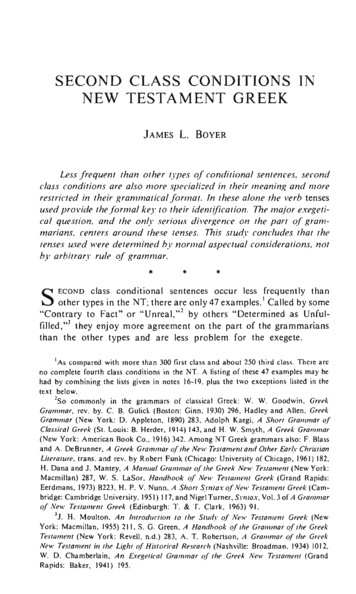
Transcription
SECOND CLASS CONDITIONS INNEW TESTAMENT GREEKJAMESL.BOYERLess frequent than other types of conditional sentences, secondclass conditions are also more specialized in their meaning and morerestricted in their grammatical format. In these alone the verb tensesused provide the formal key to their identification. The maior exegetical question, and the on v serious divergence on the part of grammarians, centers around these tenses. This study concludes that thetenses used were determined by normal aspectual considerations, notby arbitrary rule of grammar.*S**class conditional sentences occur less frequently thanother types in the NT; there are only 47 examples.! Called by some"Contrary to Fact" or "Unreal,',2 by others "Determined as Unfulfilled,,,3 they enjoy more agreement on the part of the grammariansthan the other types and are less problem for the exegete.ECOND'As compared with more than 300 first class and about 250 third class. There areno complete fourth class conditions in the NT. A listing of these 47 examples may behad by combining the lists given in nOles 16-19, plus the two exceptions listed in thetext below.2S0 commonly in the grammars of classical Greek: W. W. Goodwin, GreekGrammar, rev. by. C. B. Gulick (Boston: Ginn. 1930) 296, Hadley and Allen. GreekGrammar (New York: D. Appleton. 1890) 283, Adolph Kaegi, A Short Grammar fClassical Greek (St. Louis: B. Herder, 1914) 143, and H. W. Smyth, A Greek Grammar(New York: American Book Co., 1916) 342. Among NT Greek grammars also: F. Blassand A. DeBrunner, A Greek Grammar of the New Testament and Other Ear r ChristianLiterature, trans. and rev. by Robert Funk (Chicago: University of Chicago, 1961) 182,H. Dana and J. Mantey, A Manual Grammar of the Greek New Testament (New York:Macmillan) 287, W. S. LaSor, Handbook f New Testament Greek (Grand Rapids:Eerdmans, 1973) B223, H. P. V. Nunn, A Short Syntax fNew Testament Greek (Cambridge: Cambridge University, 1951) 117, and NigelTurner, Syntax, Vol. 3 of A Grammarof New Testament Greek (Edinburgh: T. & T. Clark, 1963) 91.3 1. H. Moulton, An Introduction to the Study of New Testament Greek (NewYork: Macmillan. 1955) 211, S. G. Green. A Handhook of the Grammar of the GreekTestament (New York: Revell, n.d.) 283, A. T. Robertson, A Grammar f the GreekNew Testament in the Light of Historical Research (Nashville: Broadman, 1934) 1012,w. D. Chamberlain, An Exegetical Grammar of the Greek New Testament (GrandRapids: Baker, 1941) 195.
82GRACE THEOLOGICAL JOURNALIDENTIFICATION OF THE TYPESecond class conditions are more formally structured than eitherof the other types. Both first and third class show a characteristicstructure only in the protasis, but the second class shows a distinctivepattern in both the protasis and apodosis; indeed, it is the apodosiswhich clearly identifies it.The protasis uses the conditional conjunction d with the verb inthe indicative mood. In this it is like the first class. But the second classuses only past tenses,' whereas the first class may usc any tense. Thus,theoretically, there can be ambiguity in the form of the protasis, but "infew cases does this cause confusion of identification.'The apodosis of second class conditions also uses a past tense ofthe indicative, usually6 with avo In almost 7 every instance, the apodosisis a simple statement of a non-fact; what would be or would have beenbut was not. This contrasts strongly with the great variety of apodosisforms occurring in the first and third classes.The negative in the protasis is almost always In], with only twoinstances of OUK. 8 This gives many examples of Ei /Ul cOlljing togetherwhere 1111 is simply the negation of the clause. There are a few instanceswhere it seems to be d 1111 "except" or "unless.,,9 The negative of theapodosis is always m']K. 1O Both 1111 in the protasis and OUK in theapodosis are what we would expect. In the protasis, which states apotential circumstance, that which might have been, 1111 is used. QUK is4These are the secondary or augmented tenses of the indicative: the imperfect,aorist. and pluperfect.5 1n about one-sixth of the first class conditions a past tense indicative verb is usedin the protasis. but the identification is unambiguous because the apodosis is notcompatible with the second class form. In a few instances (Acts 11:17, Rom 5:15, Eph4: 21, Rev 20: 15) the form of both the protasis and the apodosis could be second class,but the sense is clearly not contrary to fact. Of course, this is not unnatural; a simplecondition (first class) can be used of the past as naturally as of the present and futuretime.6,}\V Occurs in 36 examples; it is omitted in II instances. This tendency to omit avis characteristic of koine Greek.7 1n one instance (Luke 19:42) the apodosis is not stated. In two instances (I Cor12:17, 19) the apodosis is a rhetorical question implying the simple statement, "Therewould be none.""M occurs II times. The two occurrences of mix (Matt 26:24, Mark 14:21) areactually parallel passages duplicating a single occurrence.9 Th is phenomenon of E:i Jill "except" or "unless" will be dealth with separately atanother time.IOThere is a negative apodosis in 23 of the 47 examples. QUK is used in 22 of them,ouo' (oil oE "not even") in one (Heb 8:4).
BOYER: SECOND CLASS CONDITIONS83natural in the apodosis, which expresses nothing doubtful or subjective, but states matter-of-factly what actually would have been if thecondition had been true.RELATION TO REALITY: CONTRARY TO FACTThere seems to be no debate on the essential meaning of thesecond class conditional sentence. It states a condition which as amatter of fact has not been met and follows with a statement of whatwould have been true if it had. An extended paraphrase in Englishwould be, "If this were the case, which it is not, then this would havebeen true, which as a matter of fact, is not." The term "contrary tofact" therefore is an accurate descriptive name for this type. 11It must be kept in mind in the use of this descriptive term that"contrary to fact" has to do with the statement of the fact, not theactual fact itself. The speaker stales it as being contrary to fact; he mayor may not be correct in that statement. Of the 47 NT examples, 39 areby Christ or by inspired writers of scripture; in every case, thestatement is also contrary to fact in actuality. In each of the other 8examples, where' the speakers were men liable to error, they spokewhat they believed to be contrary to fact; in two instances they werewrong. 12A very significant comparison must be made here. In dealing withthe significance of the first class condition, this distinction between factand statement of fact sometimes has been used to explain those manyexamples where the first class is used in obviously false or uncertainstatements. 13 However, there is a drastic difference in this respectbetween first and second class. In the first class examples where there isa discrepancy between the actual fact and the statement of it, it is not amatter of error or ignorance; it is almost always a deliberate statementof what is known or considered by the speaker to be false. But in thesecond class, there is not a single instance of stating something ascontrry to fact which is not so in the judgment of the speaker. He ismaking what he considers a contrary-to-fact statement. There is no"A. T. Robertson's designation "Determined as Un-Fulfil1ed" seems also to be avalid characterization. The problem with his system of classifying conditional sentenceslies in his designating the first class "Determined as Fulfilled," which understandablyhas been misinterpreted as the opposite of the second class, therefore ··True to Fact."See my preceding article: "First Class Conditions: What Do They MeanT', GTJ 2(1981) 79-80.12Luke 7:39, John 18:30.13 See the discussion in my preceding article. "First Class Conditions," 77-78.
84GRACE THEOLOGICAL JOURNALsuch thing as "assuming for the sake of argument" that a statement iscontrary to fact. To put it in another way, the first class condition isnot the opposite of the second class. It is not "true to fact" in the sensethat the second is contrary to fact.SIGNIFICANCE OF TENSESIn dealing with the significance of the tenses used, two factorsrequire consideration: first, the fact that only past tenses of theindicative are used, and second, the question of the time relationinvolved.Only Past TensesContrary-to-fact conditional sentences are the only type whichhas tense limitation. Why? And why these tenses? The answer will helpto explain and support the meaning assigned to this type of construction.All conditional sentences by their very nature involve statementswhich mayor may not be true. That is what "if" means. Theuncertainty involved may be due to ignorance, supposition, choice,course of events (I call it providence), or simple futurity. If the timeinvolved is either present or future, there is always this element ofuncertainty from the viewpoint of the human speaker (both Greekand English are human languages). Only in past time has the uncertainty become certainty by actual occurrence, and even then it is notcertain to the speaker until and unless he knows about it. The secondclass condition is one which expresses the "would be" results of a pastcondition known (or thought) to be unfulfilled or contrary to fact.Very naturally, then, it uses only past tenses.It is instructive to note that this usage is but one example ofwhat grammarians have called the "potential" or "unreal" indicative.This idiom includes, beside the unreal conditional sentence , suchother uses of the augmented tenses of the indicative, with or without(lv, as in courteous or polite language (Acts 25:22, Gal 4:20), inexpressions of necessity, obligation, possibility, and propriety (Luke24:26, Acts 24:19, I Cor 5: 10), and in cautious statements andimpossible wishes (Rom 9:3). Even in English we use "ought,""would," "could"-past tense forms which are used in many of theseunreal statements. 1414 For a discussion of the idiom, consult the grammars: (classical) Goodwin andGulick, Greek Grammar, 283, 297, Kaegi , Shorl Grammar, 136, 137, Smyth, GreekGrammar, 296; (NT) Dana and Mantey, Manual Grammar, 169. A. T. Robertson,Grammar, 918-23, Turner, Syntax, 90-93.
BOYER: SECOND CLASS CONDITIONS85Time ReferenceSome grammarians have distinguished two time references insecond class conditions,. indicated by the tense used in the protasis. 15It is claimed that the imperfect tense is used for a statement which ispresently contrary to fact, the aorist and pluperfect for a pastcontrary-to-fact condition. Is this a valid distinction in NT Greek?It should be noted that this, like all considerations dealing withGreek tense, is more a matter of aspect or aktionsart than of time. Bythe very nature of the case all contrary-to-fact conditions are to someextent past in time. The decision that it is not fulfilled has alreadybeen made before the sentence is uttered or written. "If you believedMoses you would believe me" (John 5:46) is speaking of a presentsituation which is not true; they are not at that moment believing.The imperfect tense used is a durative tense. They are in a state ofunbelieving which is presently continuing but of course it has alreadybeen in existence long enough to be known as untrue. If the aoristhad been used in this protasis the sense might have been, "If you had(sometime in the past) exercised faith, you would have (now) believedme."Most NT examples fit well into this distinction. All of thoseusing the aorist l6 and the pluperfect 17 are past in time reference,properly expressed in English with a past perfect: "If it had been .it would have been . " The case is not quite so clear-cut with theimperfect, but even here two-thirds of the examples fit the pattern ,18indicating a present time reference, "if it were . , it would be . "Of the nine apparent exceptions, seven l9 are instances of the imperfectof the verb d i. Since this verb has only one past tense (apparently15 Dana and Mantey [289] make the strange assertion that "a contrary to factcondition dealing with present time has the imperfect tense in both prot as is andapodosis . a contrary to fact condition deaHng with past time has the aorist orpluperfect tense in both protasis and apodosis," even though two of the examples theycite show a mixed use, with different tenses in the two clauses. In view of the fact that16 of the NT examples actually show such mixed tenses (9 examples have the imperfectin the protasis with aorist or pluperfect in the apodo sis; 7 have the reverse situation; allbut one seem to be past in time reference) this statement obviously is an overstatement.If there is any relation between tense and time reference, it is the tense of the protasiswhich must be the determining one.16There are 16 examples: Matt 11:21, 11:23, 12:7.24:22.26:24. Mark 13:20, 14:21 ,Luke 10:13. 19:42, John 4:10. 15:20. 15:24, Rom 9:29, I Cor 2:8, Gal 3:21 . Heb 4:8.17There are 4 examples: Matt 24:43, Luke 12:39. John 8:19, Acts 26:32. John 19:1 Iis questionable. Cf. my treatment of this verse below.1'15 out of 24 examples: Luke 7:39. John 5:46. 8:42, 9:33. 9:41 , 15: 19, 18:36, 19: I I(?), Acts 18:14. I Cor 11:31. 12:17. 12:19, Gal. 1:10. Heb 8:4, 8:7.I'Matt 23:30, John 11:21. 11:32,18:30. Gal. 4:15. I John 2:19. Also, in John 14:2the verb is unexpressed but most naturally it would be v , the .imperfect of dilL
86GRACE THEOLOGICAL JOURNALthe instrinsically durative aspect of this verb rendered unnecessary thedevelopment of an aorist and pluperfect conjugation) it is conceivablethat grammatical constructions which normally called for those tensesmay have been met by substituting the imperfect. However, asidefrom this rationalization, the basic aspect of the imperfect tense fitsperfectly in each of the seven cases. While the sense demands that thetime reference is past, the kind of action is durative in that past time.The remaining two apparent exceptions to the general rule underconsideration may be explained in a similar way. In John 14:28, "ifyou loved me, you would have rejoiced," it seems clear that the timereference is. past. Earlier in the verse Christ reminded them of hisimpending departure and return and follows that statement with thiscondition. He was clearly thinking of love as a durative state of being,"if you were (at that time) loving me," rather than a specific act oflove. His use of the imperfect emphasizes this.In Rom 7:7 the case is not quite so clear. First, it may be seen asa present contrary-to-fact condition: "I would not (now) know lust ifthe law were not continually saying . " This would probably beeasiest grammatically. Even the verb in the apodosis is in sense animperfect, since the verb olba is a perfect form with a presentmeaning and its pluperfect form is the corresponding imperfect. Butthe sense resulting is impossible. Or, second, it may be seen as a pastcontrary-to-fact condition: "I would not have known lust if the lawhad not said . " If this is the sense, then the imperfect verb wouldbe calling attention to the durative aspect: "If the law were notcontinually telling me . ," emphasizing the persistent influence ofPaul's exposure to law-teaching.In summary, it seems generally to be true that an imperfect verbin the protasis of a second class condition indicates a present-timecondition and an aorist or pluperfect verb indicates a past-timecondition. The few apparent exceptions are examples where thedurative nature of the past-time condition is emphasized by the use ofthe imperfect. But the existence of a considerable number of exceptions points rather to the conclusion that this "rule" works because ofthe durative sense of the imperfect rather than because it was arequired structural pattern. It is better to approach the meaning bygiving attention to the aspect of the tenses used rather than to animagined rule.Other Noteworthy ExamplesIndividual consideration needs to be given to a few exampleswhich show some unusual characteristics.Luke 17:6. "If you have faith . you would be saying . " Theprotasis has d with a present indicative verb and is therefore a first
BOYER: SECOND CLASS CONDITIONS87class condition. But the apod'osis has liv with an imperfect verb,which fits the second class pattern. Thus it is cited as an example ofwhat grammarians sometimes call a "mixed condition. ,,20 There isnothing inherently unlikely about such a situation, and Nigel Turnerwell explains its peculiar appropriateness in this instance" as expressing a subtle politeness which avoided the harshness of saying, "If youhad faith (which you do not) . ," the blunt meaning which wouldhave resulted if he had used the full second class form." However, itis possible to see an entirely different solution to this unusualconstruction. It is clear that the protasis is first class, a simplecondition implying nothing as to whether Jesus' hearers actually hadfaith, and thus neither congratulating them nor criticizing them.Furthermore, it is clear from multitudes of examples that the apodosisof a first class condition may be of any form (declarative, hortatory,command, promise, rhetorical question, wish, etc.). A normal usageof Civ with the imperfect which is not a second class apodosis doesexist: it may well be the "potential" use of past tense indicatives forcourteous or polite language or to express present necessity, obligation, possibility, or propriety.2J Applying this grammatical usage tothis passage, the' sense becomes, in expanded paraphrase, "If youhave faith, you could say to this mountain . ," or, "it would be rightand proper for you to say . ," or, "if you have faith there is nothingyou cannot ask for."John 8:39. "If you are Abraham's children, you would be doingthe works of your father" may also be an example of a mixedcondition, with a first class protasis to soften the harshness of thestatement. The textual tradition would suggest this understanding,whether the United Bible Society preferred reading btalEl1:E or theByzantine text iiv &7taU;ln; is followed. In this instance, the explanation of the apodosis as a potential indicative, suggested for thepreceding example, is not agreeable to the sense. Another reading, theimperative 7talEl-rE, followed by the NASB, would be a regular firstclass condition.Heb 11:15. "If they were remembering the place from which theywent out, they would have an opportunity to return" also involves atextual variation. The apodosis is clearly of the second class. In the20 A .21N.T. Robertson . Grammar, 1022.Turner, Grantmo{/cal Insight s into the New Testament (Edinburgh: T. &. T.Clark, 1965) 51-52.22See my note on Turner's questionable understanding of the significance of thefirst class condition as reflected in his treatment of this passage in my preceding article." First Class Conditions," 81, n. 17.BSee my discussion of this idiom earlier in this article. Also, R. Law, "]mperfectof 'Obligation ' etc., in the NT ," ExpT 30 (1919), 33Off.
88GRACE THEOLOGICAL JOURNALU BS text the protasis has its verb in the present indicative and is thusof the first class. But the Byzantine text, accepted here by Westcottand Hort, has the imperfect tense, making the whole a normal secondclass condition. Here the time reference is actually past, even thoughimperfects, according to the rule discussed earlier, would be considered by some to signal a present contrary to fact. Perhaps thewriter uses this "present" form from the same vantage point as in thepreceding verse, which uses the "historical present" to express vividlya past situation. Or perhaps the present time reference in both versesis the "gnomic present"; it is always or characteristically true that ifsomeone keeps looking back there are opportunities to go back. Theuse of the durative imperfect stresses the continuing situation: "if theywere remembering . they would be having continuing opportunityto return."John 19:11. "You would have no authority over me if ithad notbeen given you from above." The problem here also is the timereference. If the verb of the protasis is taken as Tjv 8E1l0IlEVOV, aperiphrastic pluperfect, then the time reference would be past, "If ithad not been given . " If the verb is understood to be Tjv alone, withthe perfect participle functioning as a predicate adjective, then theimperfect verb might be signaling a present contrary to fact: "if itwere not (now) an authority which has been given you . " It isprobably a distinction without a difference. In either case, the imperfect in the apodosis indicates the present situation.
H. Moulton, An Introduction to the Study of New Testament Greek (New York: Macmillan. 1955) 211, S. G. Green. A Handhook of the Grammar of the Greek Testament (New York: Revell, n.d.) 283, A. T. Robertson, A Grammar f the Greek New Testament in the Light of Historical Research (Nashville: Broadman, 1934) 1012, w. D.


